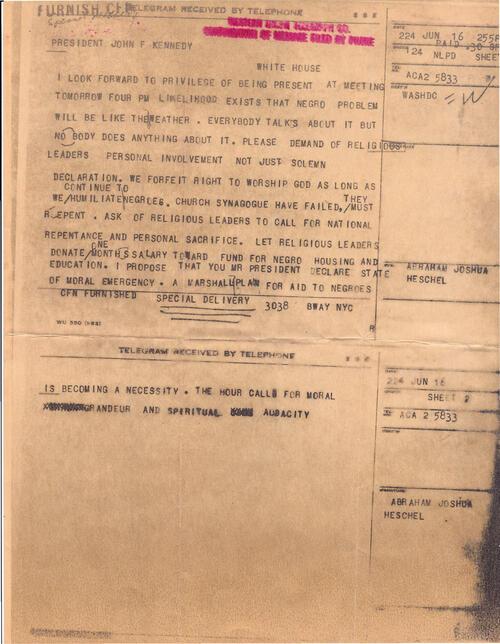Abraham Joshua Heschel
Abraham Joshua Heschel (1907-1972)
Born in Warsaw into a Hasidic dynasty in 1907, Abraham Joshua Heschel was ordained in Europe. He also pursued a secular education, but was unable to finish his doctorate in Germany because of anti-Semitism. After Adolf Hitler came to power and began his campaign against the Jews, many rabbinic seminaries in America invited European rabbis to teach at their schools. In this way, Abraham Joshua Heschel came to Hebrew Union College-Jewish Institute of America (the Reform movement's seminary) in 1940. Later, he moved to the faculty of the Jewish Theological Seminary, feeling that this was a better fit with his traditional Jewish background and views.
Abraham Joshua Heschel is considered to be one of the great theologians of the twentieth century. He wrote on many Jewish topics including the Prophets. Heschel's experience during the Holocaust and his study of the Jewish prophets influenced his belief that Judaism required of one both deeds and actions. Known as "Father Abraham" to many of Martin Luther King's followers, Abraham Joshua Heschel was an outspoken activist for civil rights who marched with King, met with John F. Kennedy about civil rights legislation, and is celebrated by many in the Jewish community for his involvement in the Civil Rights Movement and other movements for social justice. His reflection on participating in the civil rights march from Selma to Montgomery, Alabama in March, 1965 -- "I felt my legs were praying" -- has become a model of activism as religious practice.
Telegram from Abraham Joshua Heschel to President John F. Kennedy, June 16, 1963
Telegram from Abraham Joshua Heschel to President John F. Kennedy, June 16, 1963.
Published in Moral grandeur and spiritual audacity: essays, ed. Susannah Heschel (New York: Farrar, Straus & Giroux, 1996), vii.
Rabbi Abraham Joshua Heschel on the Selma March, March 21, 1965
Rabbi Abraham Joshua Heschel marching with other civil rights leaders from Selma to Montgomery, Alabama, on March 21, 1965. From far left: John Lewis, an unidentified nun, Ralph Abernathy, Martin Luther King, Jr., Ralph Bunche, Abraham Joshua Heschel, Rev. Fred Shuttlesworth.
Discussion Questions
Part I
- Initial assessment: Who wrote this telegram? When was it written? What was the context for writing the telegram?
- How do you think the format (a telegram) might have influenced the message?
- Who was his specific audience? What larger audience might this telegram also have been meant for?
- In the first half of the telegram, Heschel asks the president to make some demands of religious leaders. Let's recap: What are these demands? Why does Heschel think this is necessary? Your interpretation: What do you think of a religious leader asking the President of the United States (a secular leader) to make religious demands of religious leaders?
- In the second half of the telegram, Heschel makes certain proposals to the President. What are these proposals? Your interpretation: How do they blend religious issues and political issues?
- Heschel says that "We forfeit the right to worship God as long as we continue to humiliate Negroes." What do you think he meant by this? Do you agree? Do you think worshipping God is a right that we earn through our actions? If so, what do you think are the kinds of actions that might forfeit this right?
- What do you think Abraham Joshua Heschel meant when he said "The hour calls for high moral grandeur and spiritual audacity?" What do those words mean to you?
- What do you think the purpose of this telegram is?
Part II
- How do you think Abraham Joshua Heschel's experience and/or Jewish values influence his participation in the Civil Rights Movement? What in the telegram makes you say that?
- Do you think this is an appropriate role for a rabbi? Why or why not?
- Are there any current political/social issues on which you think rabbis today should take a stand? What kind of role would you want to see them take?




